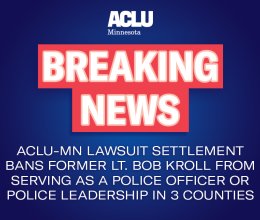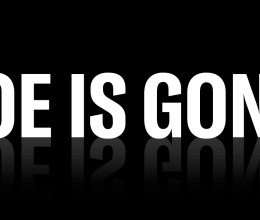On May 15, 2018, the ACLU of Minnesota submitted a letter to Governor Mark Dayton urging him to veto HF 390, an anti-protest bill passed by the Minnesota legislature this month. The anti-protest bill would increase penalties for protesters that block a highway, public transit, or airport access.
Read the ACLU-MN full letter below:

May 15, 2018
Governor Mark Dayton
130 State Capitol
75 Rev. Dr. Martin Luther King Jr. Blvd.
St. Paul, MN 55155-1611
Via U. S. Mail
Re: Veto of H.F. 390
Dear Governor Dayton:
On behalf of the ACLU of Minnesota and its 44,000 supporters throughout Minnesota, I urge you to veto H.F. 390, the anti-protest bill passed by the Legislature.[1]
H.F. 390 is designed, not to improve public safety, but to squelch dissent and chill constitutionally protected speech. The punishments it would impose are vastly disproportionate to the offense. And no law enforcement agencies or members of the public testified to support it. H.F. 390 is a partisan dog whistle intended to strike fear into the hearts of patriotic citizens whose goal is to shine a spotlight on challenges we face as a state and as a nation.
By increasing potential fines and jail time for protesters whose assemblies may briefly limit access to transit facilities, H.F. 390 is intended to make it more perilous for protesters exercising their right to free speech—the cornerstone of our democracy. The Constitution protects protests even when – and especially when – they stir anger, question preconceptions, challenge government policy, and induce dissatisfaction with the status quo. The First Amendment safeguards protesters’ rights to awaken passions and to make the public aware of their positions and opinions.
America’s robust tradition of free speech allows all of us to effect change by making our voices heard. In fact, law enforcement agents have an affirmative duty to protect the rights of protesters and the press. Over the past several years, we have seen a historic level of activism and protest that has spilled into our nation’s parks, streets, and sidewalks — places where our First Amendment rights are sacrosanct.
For example, the January 21, 2017, Women’s March was likely the single largest day of protest in American history. Unfortunately, legislators all over the country have reacted to this historic level of activism by introducing legislation like H.F. 390 to try to enact heavy-handed punishments designed to chill speech and silence dissent.
H.F. 390 is not aimed at just any interference with transportation. It does not concern itself with congestion arising out of sporting events (like the Super Bowl), community celebrations (like the St. Paul Winter Carnival), or commercial activity (like Black Friday). Oh, no. This bill is explicitly aimed at conduct linked to expressive speech and conduct. Think about the Boston Tea Party, the march at the Edmund Pettus Bridge, student campus occupations protesting the Vietnam War, and the Standing Rock protests. H.F. 390 targets this kind of activity. We look at these protests now through the lens of history as important turning points. But, just like the Black Lives Matter protests of today, they were once newspaper headlines.The authors of H.F. 390 explicitly stated in committee hearings that they are targeting the Black Lives Matter movement, which demonstrated in response to the officer-involved shooting deaths of Jamar Clark and Philando Castile. Supporters of H.F. 390 argue that it is needed to protect public safety. It is not. Neither law enforcement representatives nor concerned members of the public testified in support of H.F. 390, demonstrating that Minnesota has already adequately criminalized demonstrations that get out of hand.
A U. S. Court of Appeals has held that a city’s power to protect public safety “must be ‘exerted so as not to deny or unwarrantedly abridge the right of assembly and the opportunities for the communication of thought and the discussion of public questions. . . .’”[2] Thus, the court held, the risk of running afoul of an ordinance that criminalized marching without a permit impermissibly chilled speech and constituted “a burden on free expression that is more than the First Amendment can bear.”[3] H.F. 390 unfairly raises the ante for people who are considering attending a protest. They would need to ask themselves: What if I end up spending a year in jail? This is precisely the result the bill’s authors intend.Finally, H.F. 390 prescribes vastly disproportionate punishments. This bill would punish a person who inconveniences others the same way the law punishes a person who is found guilty of Assault in the Fifth Degree (Minn. Stat. §609.224), Domestic Assault (§ 609.2242), False Imprisonment (§609.255), Criminal Sexual Conduct in the Fifth Degree (§609.3451), and Malicious Punishment of Child (§609.377). Put simply, the punishment does not fit the crime.
Our recent article on this topic in The Hennepin Lawyer is enclosed.
Increasing penalties for specific types of protest will not deter crime or improve public safety. The only thing H.F. 390 will do is send a clear message to Black Lives Matter activists and others that protests in the tradition of Rev. Dr. Martin Luther King, Jr. in Selma, and the Sons of Liberty in Boston will be punished by a year in jail. Silencing dissent in a paper-thin guise of promoting safety will hurt all of us. With all of the political turmoil and unrest in this country, now is not the time to punish peaceful protest.
We urge you to veto H.F. 390 and any other bills that contain anti-protest provisions.
Respectfully,

John B. Gordon
Executive Director
Cc: Joané McAfee, Senior Policy Advisor, NGA Homeland Security & Public Safety Advisor (via email: Joane.McAfee@state.mn.us)
[1] The ACLU of Minnesota is a nonpartisan, nonprofit organization dedicated to defending the civil liberties of all Minnesotans under the United States and Minnesota constitutions. We promote our mission through litigation, public education, and lobbying.
[2] American-Arab Anti-Discrimination Committee, v. Dearborn. 418 F.3d 600, 611 (6th Cir. 2005) (quoting Cox v. Louisiana, 312 U.S. 536, 574 (1965)).
[3] Id.


